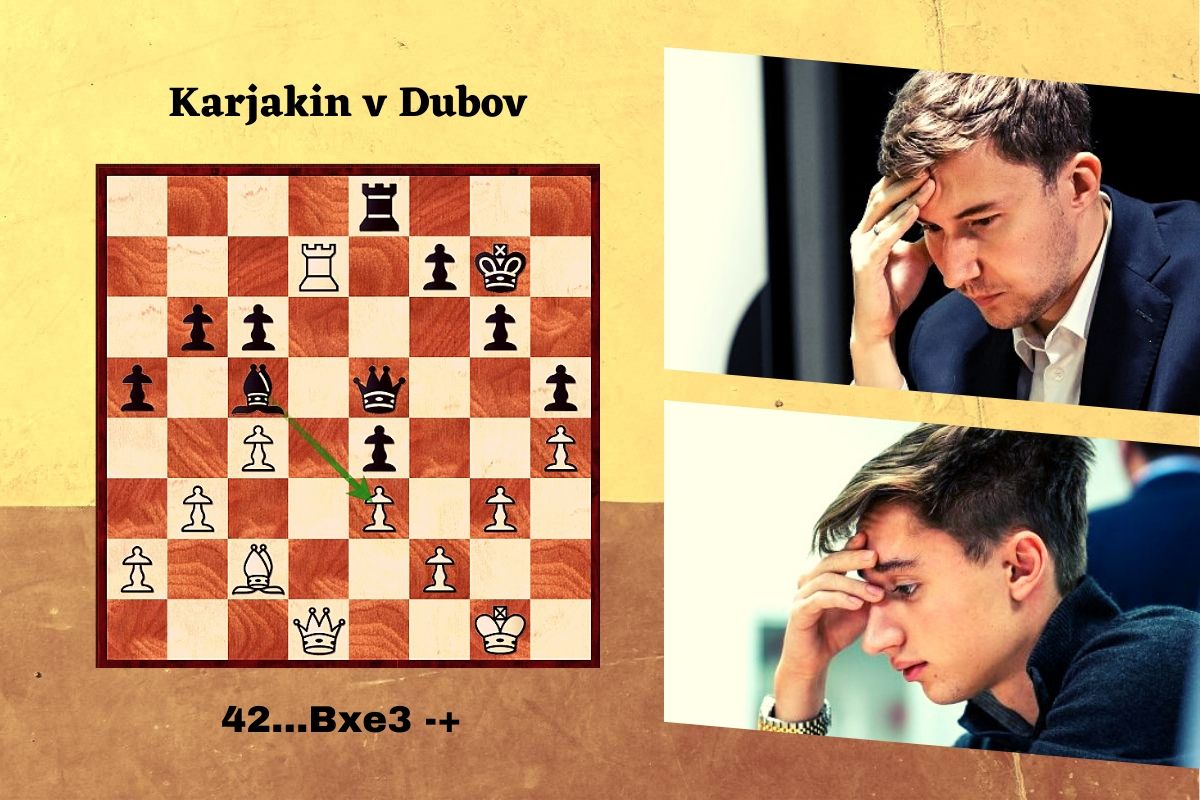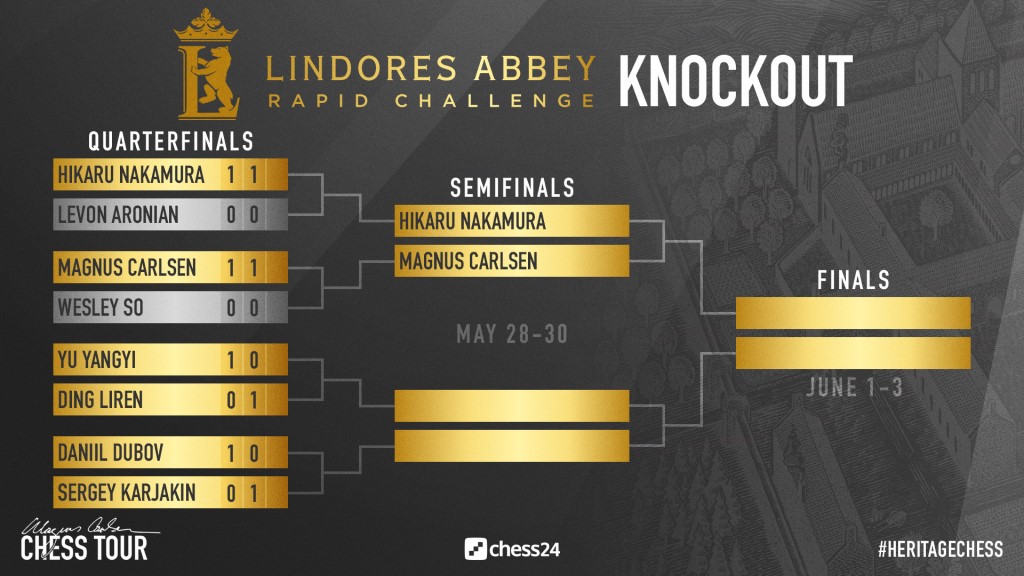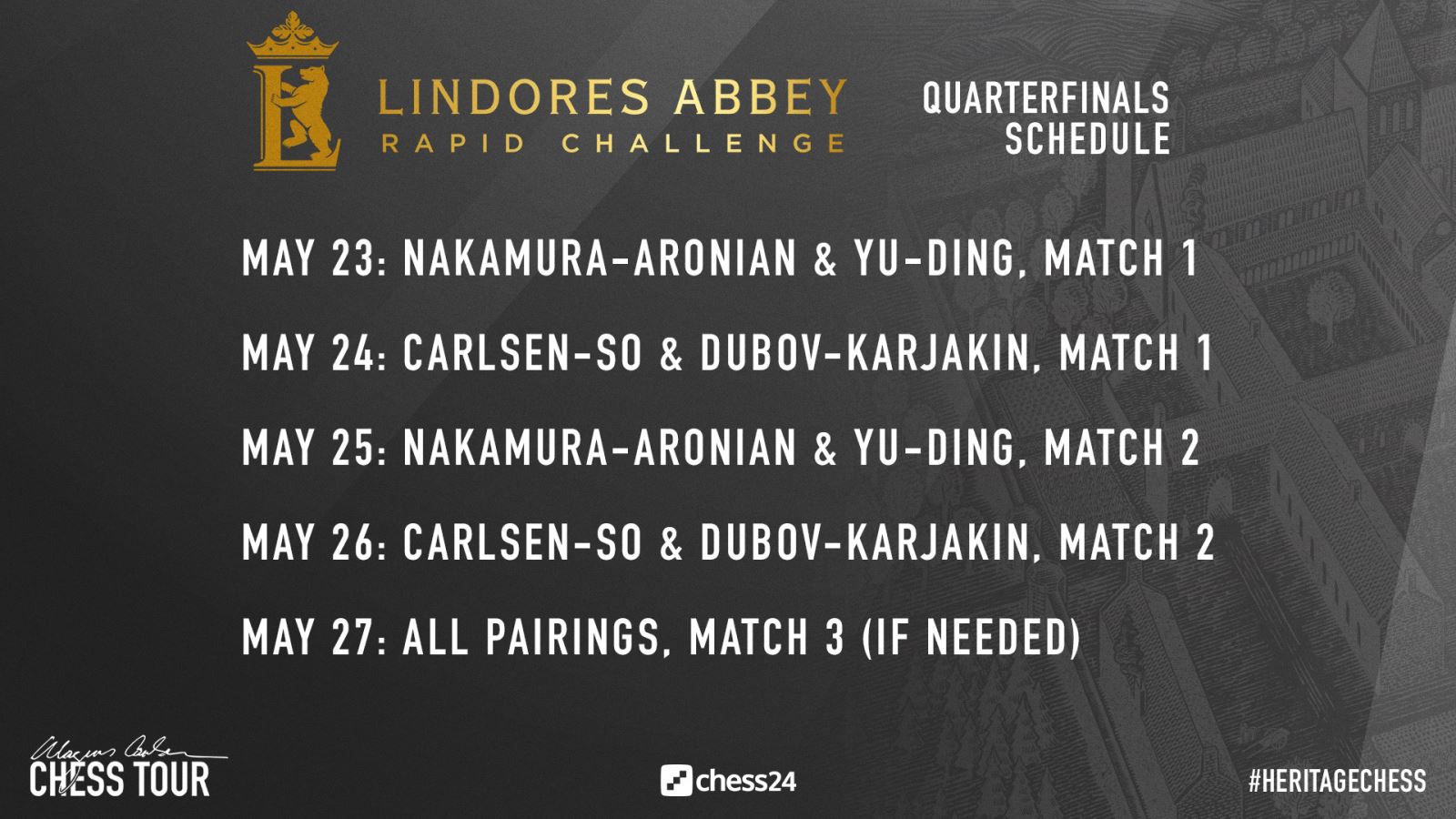


ChessBase 17 - Mega package - Edition 2024
It is the program of choice for anyone who loves the game and wants to know more about it. Start your personal success story with ChessBase and enjoy the game even more.
The Lindores Abbey Chess Challenge started on May 18th. Twelve players are taking part. After a three-day preliminary, the best eight players will advance to the deciding knockout section. The time control is 15 minutes for the game, with a 10-second increment per move.
The second mini-match between Daniil Dubov and Sergey Karjakin had no draws, as the players traded blows in the rapid games, and Karjakin won the Armageddon with black to take the contest to a third and deciding rubber. While Dubov responded to 1.e4 with 1...Nc6 and 1...d5 the times he had black, Karjakin tried — and for the most part managed — to create positions that were more suited to his style: technical endgames with fixed pawn structures.
Dubov, who came from winning the first rubber, was up on the scoreboard after game three, but was not able to hold a draw against his stubborn opponent in the fourth encounter. The ever-fighting Karjakin then chose to play black in the Armageddon decider. Dubov had a strong attack, but was unable to find one of many potential winning continuations at critical points. Once the position stabilized, he tried to push for more — as Black had draw odds — and ended up losing the game and the mini-match.
About an hour prior to the end of the all-Russian confrontation, Magnus Carlsen had already secured his spot in the semis, by scoring a second 2½:1½ mini-match victory over Wesley So. The latter was outplayed by his famed opponent in game one and, after quickly drawing the second encounter, failed to bounce back and even lost a messy game three. The world champion will face Hikaru Nakamura in a repeat of the Magnus Carlsen Invitational final.

Once Karjakin won the Armageddon against Dubov, he talked to the official commentary team, which on Tuesday included Peter Svidler in their roster. With his usual friendly demeanour, Karjakin reminded Svidler about the roller-coaster of a final they played at the 2015 Baku World Cup, when Karjakin's stubbornness in continuing to play while having nearly lost positions served him well, seeing his opponent collapse inexplicably more than once on his way to winning the ten-game match.
Karjakin's victory over Dubov was somewhat similar, although, of course, the stakes were not nearly as high. In game one, for example, converting the knight endgame a pawn up seemed really difficult, but Karjakin managed:
Chess Endgames 6 - Endgame Principles Domination & Prophylaxis
Endgame principles domination & prophylaxis
Karsten Mueller’s endgame course has already taken its place amongst the modern classics in the study of the endgame. Whereas the first 4 DVDs of his series were systematically organised according to the distribution of material, Volume 6 continues the explanation of general endgame principles begun in Volume 5. The principles dealt with in this DVD are domination and prophylaxis, not being over-hasty, zugzwang and schematic thinking.
Of course, finding the precise defensive constructions is also though. Dubov's 47...Kd6 was imprecise, and Karjakin jumped to the opportunity, penetrating with his king and showing good technique in the tricky ensuing knight battle.
Dubov won games two and three, mating his experienced rival in a lengthy 97-mover and scoring a full point from the black side of a Scandinavian. But Karjakin's patience came to the fore in game four:
White had gained control of the d-file and was moving his rook up and down the board as he only needed a draw to win the match. Karjakin had more space, though, and there were too many pieces over the board for him to give up. His chance came in the diagrammed position, after Dubov erred with 42.Rd7 — the 2016 World Championship challenger quickly found 42...Bxe3 43.fxe3 Qxg3+ and went on to get the much-needed win with a clear-cut attack.
Karjakin chose to play black in Armageddon, getting draw odds. Dubov employed his usual enterprising style, advancing his e and f-pawns early on, and got a superior position. The Muscovite failed to finish off his opponent when he got a chance:
And Action! - How to crown positional play by tactics
There are few names which, like that of Alexei Shirov, can be associated with fantastically imaginative and tactically influenced play. Now the Latvian grandmaster is presenting a DVD on precisely that element of the game of chess. And one that is completely based on his own games.
Dubov played 31.Nf5, which does not spoil his edge but is not as direct as 31.Nxg6 fxg6 32.Bxg6, when it is difficult to imagine anyone holding with black in a blitz game. The computer actually considers as best the even more spectacular 31.Rf5 — if someone might have dared to go for this manoeuvre under the circumstances, it would have been Dubov!
After the text, however, Karjakin managed to keep things under control and, when the position looked close to equal, Dubov blundered and ended up losing the game. The exciting confrontation will be decided on Wednesday, with another four-game mini-match.
Select an entry from the list to switch between games
There was less drama in the repeat of last year's Fischer Random World Championship final, but a fair amount of fighting chess was seen nonetheless. In game one, a long strategical battle out of a Ruy Lopez saw the world champion getting the upper hand with black in the middlegame. So finally crumbled under pressure and resigned on move 61, when there was no way to stop Black's passer on the g-file:
Master Class Vol.8: Magnus Carlsen
Scarcely any world champion has managed to captivate chess lovers to the extent Carlsen has. The enormously talented Norwegian hasn't been systematically trained within the structures of a major chess-playing nation such as Russia, the Ukraine or China.
White resigned.
Known for his solid approach, So played the Berlin with black in game two, and agreed to a quick draw after 29 moves. The American had put all his hopes on his coming game with white, when a completely chaotic struggle saw both players missing chances at different junctures. So was the one making the last mistake, though:
If we see what happened in the game from this point on, it becomes clear that White needed to play 31.Kh1 in this position. So's 31.Rxe8 lost by force to 31...Rxe8 32.Qxe8 Nf3+ 33.Kh1 Qd3 34.Bd2 Qxd2 and White resigned. Another short day at the office for the world champion.
Select an entry from the list to switch between games
Mastering the Sicilian Najdorf
This Najdorf-DVD is suited for the beginner as well as experienced club players. Pelletier presents a classical repertoire that's easy to learn and covers all you need to know about the Najdorf.
